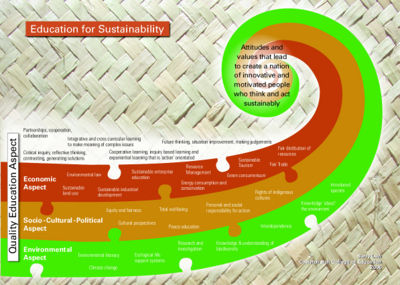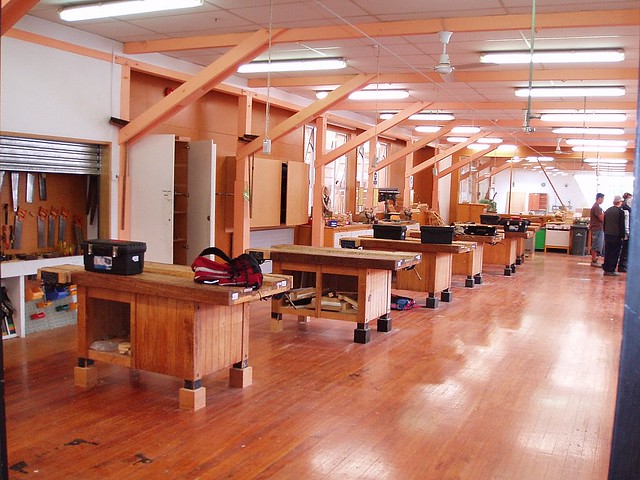 |
| The Education for Sustainability swirl |
- How can you become a more sustainable practitioner?
- What sort of learning and teaching strategies meet your philosophy of sustainability?
- Post your reflections about sustainability to your blog once you have viewed the presentations and completed the readings.
- Read the article on student workload and find out how to calculate it - Lockwood, F. (2005). Estimating student workload, readability and implications for student learning and progression. Australia: ODLAA.
- Watch Sir Ken Robinson discuss Do schools kill creativity?: "we are educated out of creativity not into it". He ends with saying: "we have to educate the whole person". This 20 minute video is well worth watching.
 |
Otago Polytechnic Block L - Carpentry by leighblackall |
The tertiary education sector is highly competitive, and now that funding is shrinking even further organisations are scrabbling for a slice of the pie. Is Flexible Learning the answer? What strategies are working well and give organisations the edge? In this topic we will explore and justify some approaches to providing flexible learning environments in tertiary organisations. The Horizon report is worth a look each year to see what technologies are being predicted in the educational sector. 2011 Horizon report.
Activity Ten
- How do your ideas and strategies for flexible learning fit with your organisation?
- Post a response to your blog once you have explored your organisation's policies and strategies.
- Locate your educational organisation's strategic plan, charter or profile (or equivalent). It is usually a public document with mission statements, aims and objectives, and performance indicators.
- For example, the 2008 - 2012 Strategy for Otago Polytechnic.
- The Otago Polytechnic Charter. Other Otago Polytechnic strategic documents.
- Highlight statements that refer to or relate to flexible learning.
- Explore blogs of Otago Polytechnic staff who publish notes on their efforts.
- Fisher, K.(2010). Technology-enabled active learning environments: an appraisal. CELE Exchange 2010/7. OECD.
- Listen to or read the article: Annand, D. (2007). Re-organizing Universities for the Information Age. The International Review of Research in Open and Distance Learning, Vol 8, (3), 1-9.
- Getting Results in Literacy and Numeracy report. Tertiary Education Commission, New Zealand. An update of what has been achieved to date and next steps for the tertiary education sector.
- Read the article - The edgeless university
Labels: FL11, Organisational policy and strategy, week 11
Wk 11: May 19-25: Issues with flexible learning - Cultural diversity
0 comments at Saturday, May 17, 2008 As our local economies become exposed to more and more global influences, our services need to develop sensitivity to the increased cultural diversity. Social changes like increased cultural diversity can happen rapidly but many of our service sectors respond slowly, such as education. As a result many people suffer stresses to do with unintended insensitivity and sometimes even prejudice. Individuals within dominant or subcultural classes, people with indigenous cultural identity, migrants, gender and sexuality, religious preferences... everyone has a need for sensitivity. What can we do to help alleviate the stress and pressures that many individuals can experience when interacting with larger bodies or organisations that tend to generalise their services for people?
As our local economies become exposed to more and more global influences, our services need to develop sensitivity to the increased cultural diversity. Social changes like increased cultural diversity can happen rapidly but many of our service sectors respond slowly, such as education. As a result many people suffer stresses to do with unintended insensitivity and sometimes even prejudice. Individuals within dominant or subcultural classes, people with indigenous cultural identity, migrants, gender and sexuality, religious preferences... everyone has a need for sensitivity. What can we do to help alleviate the stress and pressures that many individuals can experience when interacting with larger bodies or organisations that tend to generalise their services for people?
This week you need to think about any observations you have made of systemic cultural insensitivity in an educational organisation or institution, and ideas on how you as an individual might address those problems through the development of flexible learning.
Check out the To do section for the course on WikiEducator and the extra resources.
- Join Kate Timms from Otago Polytechnic's Educational Development Center in a web conference on Thursday 22 May at 10am (UTC 10pm 23 May) to hear stories relating to cultural diversity in educational institutions. Learn about the Polytechnic's policy for cultural inclusion and discuss thoughts and ideas on how to be more culturally sensitive in our work designing for flexible learning practices.
Please fill out the polls as your feedback is very helpful so we can offer the type of learning experience you need. And if you want to catch up with what was discussed in the last presentation on access and equity, and contribute to a discussion about assessments and flexibility, do check out Bronwyn's blog post.
